Contact information: Productivity@oecd.org
Website
http://oe.cd/GFP February 2024

Contact information: Productivity@oecd.org
Website
http://oe.cd/GFP February 2024
The Global Forum on Productivity (GFP) was created in 2015 from an initiative of several teams in different parts of the OECD (Economics Department and Directorate for Science, Technology and Innovation) and endorsed by their respective OECD committees, namely the Economic Policy Committee (EPC), the Committee on Industry, Innovation and Entrepreneurship (CIIE) and the Economic Development Review Committee (EDRC). The GFP revolves around three axes – research, convening and communication – which draw upon, complement, and enhance the work already designated within the work programme of these Committees.
As a platform for mutual exchange of information and ideas, the GFP is a forum to discuss the latest analyses and best practices in public policy through which governments combine efforts to uncover the structural and policy factors behind the productivity slowdown. Through this concerted mission to foster international collaboration, the GFP gives government institutions the opportunity to discuss their views on institutional setups, share data and knowledge and undertake joint policy analysis.
The present Activities Report summarises the work carried out by the GFP over 2023 and is structured in four sections: (i) About the GFP; (ii) Research; (iii) Events; and (iv) Communication.
The GFP is guided by its Steering Group, whose members fund the activities and decide the programme of work of the Forum, as well as the allocation of available funds among three main activities: research, convening and communication.
In addition to determining the work agenda of the GFP Secretariat at OECD, contributors have the possibility to engage in joint research and policy analysis.
They can also co-organise and host GFP events to catalyse the public debate about the importance of productivity growth in their country, and to raise the international and domestic visibility of their respective institutions. These events also provide an opportunity to network with high-level academics at the forefront of productivity research, and with officials from other countries.
Finally, GFP contributors have access to a password-protected interactive platform to facilitate information-sharing among them.
In 2023, the Steering Group was composed of 22 members, representing countries or international institutions: Australia, Belgium, Brazil, Canada, Chile, Costa Rica, Denmark, France, Germany, Hungary, Ireland, Italy, Japan, Luxembourg, New Zealand, Portugal, Spain, Slovenia, Sweden, the United Kingdom; the European Commission and the Asian Productivity Organization (APO).
Contact us to find out more about eligibility at productivity@oecd.org or visit our website: http://oe.cd/GFP
The Steering Group of the GFP appoints co-chairs to coordinate the activities of the Forum. In 2023, the GFP co-chairs were Rita Bessone Basto (Portugal), Ottavio Ricchi (Italy), and Stefan Profit (Germany) joined by Ihssane Slimani Houti (France) and Rodrigo Krell (Chile) since the October Steering Group meeting.
Rita Bessone Basto currently works at the Bank of Portugal and was Deputy Director of the Office for Strategy and Studies of the Portuguese Ministry of Economy and Maritime Affairs . Her previous position involved work on the analysis of productivity and its determinants, in the context of the national productivity board; on policy evaluation models; and assessment and policy advice on economic developments and policies. She worked in areas of financial stability and macroprudential policy, DSGE models with financial frictions, international relations, and monetary and financial issues. She holds a Ph.D. in Economics from the University of Exeter (UK).
Ottavio Ricchi is the Chief Economist of the Italian Ministry of Economy and Finance. He was formerly in charge, in turn, of the potential output, structural public finance estimates, debt sustainability projections and productivity analysis unit, of the macroeconomic forecasts unit and of the liaison unit with the EU-Economic Policy Committee. He is the chair of the EU-Output Gap Working Group. He graduated from the University of Naples and holds an MSc in economics at the University of York (UK) and a Ph.D. in Economics from the University of Exeter (UK). His main areas of interest include productivity analysis, economic modelling, public finance, and international economics.
Stefan Profit is the Deputy Director-General at the German Federal Ministry for Economic Affairs and Energy. His directorate deals with macroeconomic developments, economic analyses and projections. Before taking up this position, he was in charge of a unit focusing on the empirical research in the field of inclusive growth, productivity and investment, as well as assessing growth and distributional effects of structural reforms. Stefan is also Deputy chair of the OECD Working Party 1 of the Economic Policy Committee. He has an academic background in labour economics and holds a Ph.D. in Economics from Humboldt University Berlin.



Ihssane Slimani Houti is Deputy Assistant Secretary for Macroeconomic Policies at the French Treasury. Before starting this position in March 2023, she was Head of Export Credit Finance on Aerospace, Defence and Shipping and Head of Tax Policy and Public Spending Unit. She joined the Directorate General of the Treasury in 2010 as Deputy Head of the Tax Policies Unit and worked at the National Institute of Statistics and Economic Studies (INSEE) as an economist before becoming Deputy Secretary General of the Paris Club from 2016 to 2018. She holds degrees in economics and business from École Normale Supérieure (Cachan), Sciences Po Paris, and École Nationale de la Statistique et de l’Administration Économique (ENSAE).
Rodrigo Krell acts as the Executive Secretary of CNEP and Research Economist. With a Master a Ph.D. in Economics from New York University and a Master in Economics from the University of Chile, he was head of regulation and studies at the Chilean Ministry of Economy and chief economist at InvestChile. Moreover, he is an adjunct professor at the Faculty of Economics and Business at the University of Chile.


Participation in the Steering Group entails a commitment to contribute a minimum of 25 000 Euros per year to fund the GFP. This budget covers the following costs: (i) the policy research agenda elaborated according to the preferences of the Steering Group, (ii) the management of the network and the organization of events (conferences, workshops and other types of convening), and (iii) the communication and dissemination of the activities of the Forum. Contributors to the Steering Group are at the centre of the GFP and guide the activities of the Forum during Steering Group meetings. These meetings also give contributors an additional possibility to share any relevant work being done in their respective institutions.
During the Fall Steering Group meeting, the GFP presents the results of research work carried out during the year, and contributors decide the programme of work for the next year or biennium. New membership proposals are also expected to be presented on this occasion.
At the Spring Steering Group meeting, contributors overview the budget situation of the previous year, receive its full financial report and a budget estimate for the ongoing year, and overview the planned activities for the year. In view of improving the financial stability of the GFP and enhancing the coherence and continuity of its programme of work, contributors are expected to send their voluntary contributions by the Annual Conference of the GFP.
l Presentation of analytical work
l Overview of the budget situation
l Agreement on the work programme of the next year
l Financial statement of the previous year and budget estimate for the current year
l Appointment of the Co-chairs for the current year
l Oversight of ongoing activities
l Countries are expected to send their voluntary contributions

The analytical activities of the GFP revolve around the programme of work established by the GFP Steering Group and help to spur collaborative research within the OECD and in joint projects with member countries. The research topics explored by the GFP correspond to the priorities identified by Steering Group members and have synergies with the work programme of the OECD Committees.
The post-COVID world has seen the intensification of governments’ efforts to achieve the transition to a world with zero greenhouse gas emissions. It is still unclear, however, whether these efforts will bear gains for aggregate productivity too, and whether these gains will be shared across both leading and laggard firms. On the one hand, investments in new, green technologies and innovation can bring about productivity gains for investing firms; on the other hand, the same investments may require temporary adjustments in the organisation of production, thus worsening firms’ performance in the short term, and more so for firms where complementary assets (e.g., adequate human capital and managerial practices) are missing.
The Green Side of Productivity project tackles these important questions by looking at how prepared a firm’s workforce is to undertake green tasks. Firms that are less prepared for the green transition, i.e., that employ fewer workers engaged in green tasks, may be more likely to experience weak productivity growth, or altogether miss out on the potential productivity gains of the green transition. The distribution of these jobs across firms becomes a crucial insight into the future of productivity.
The GFP working paper employs linked employeremployee data to estimate the intensity of firms in green and brown jobs. To do so, it constructs various measures of the Greenness and Brownness of occupations in the International Standard
Classification of Occupations (ISCO), which has the key advantage of being comparable across countries. Different versions of greenness measure the importance of tasks that are oriented towards environmental sustainability in a given occupation. By contrast, brownness scores classify occupations according to how likely they are to be part of pollution-intensive activities.
Firms that are less prepared for the green transition, may be more likely to experience weak productivity growth, or altogether miss out on the potential productivity gains of the green transition.
The analysis shows that results on intensities of green and brown jobs across sectors can vary significantly depending on the measure of greenness and brownness that are considered. The indicator chosen can affect the level of the intensities as well as the ranking of sectors by these matrices.
Nevertheless, correlating the greenness of a firm’s workforce to the firm’s productivity yields very
similar patterns across the different measures. Results from Portugal and France indicate that more productive firms indeed rely more on green jobs and less on brown jobs, independent of other factors, such as firm size, management, and other skills in the firm. For a medium-productivity firm, replicating the green workforce composition of a frontier firm could lead to a 1-3% increase in productivity.
The evidence is a first step in a potentially larger series of analyses, where one can cover a broader set of countries, explore the role of complementary firm assets, and investigate whether the reallocation of labour between brown and green firms can improve aggregate productivity.
Further reading:
Scholl, N., S. Turban and P. Gal (2023), “The green side of productivity: An international classification of green and brown occupations”, OECD Productivity Working Papers, No. 33, OECD Publishing, Paris, https://doi.org/10.1787/a363530f-en.
Firms’ productivity crucially relies on the productive use of its workforce. Recruiting firms can fail to find the worker that perfectly matches the requirements of the job vacancy (labour shortage). Firms, then, often rely on imperfect matches, i.e., workers that can be either recruited from the market or reallocated from elsewhere in the company, but that do not have the perfect experience or skills (labour mismatch). At the aggregate, the match of worker and position can impact both the productivity of the single firm (within-firm effect) and the ability of firms to enter, exit or grow in a market (between-firm effect).
These dynamics are the focus of the GFP programme of research for 2023-2024, which is developing in multiple streams of work. Taken together these distinct streams of analysis will provide an in-depth and original picture of how labour allocation impacts firm and aggregate productivity across countries.
In first instance, the GFP built a new dataset of indicators of labour shortages and mismatches that cover more than 30 countries from across the world, for the 2010-2019 period. Multiple data sources contribute to the richness of the study, encompassing key aspects such as employment, unemployment, qualifications, and job vacancies. Labor Force Surveys serve as foundational datasets, while postings data are extracted from Lightcast, which collects online job openings and from official statistics. The research rigorously ensures data consistency and reliability through the harmonization of definitions and scales, imputation of missing values, and cross-validation.
Crucially, the indicators are estimated at the A38 Industry level on the ISIC rev.4 classification, providing a more detailed disaggregation than
current existing datasets, while ensuring crosscountry comparability. Incorporating sector-level, representative information, emphasises the inherent heterogeneity of labour shortages and mismatches across various industries, and allows for a more nuanced understanding of the complex interplay of factors influencing labour market allocation. Figure 1 shows, indeed, that growth in labour shortages and mismatches since 2010 has been different across sectors, and especially remarkable for tightness.
The focus at the sector level is particularly important to assess how shortages and mismatches are shaped by prevailing economic megatrends. Labour shortages and mismatches can result from various factors, including cyclical changes in demand for goods and services, demographic shifts, insufficient investment in education and training, and various policy actions that can restrict the supply and mobility of labour (housing and immigration policies, childcare and household support policies, wage bargaining institutions, etc.). The GFP analysis focuses on four economic megatrends: population aging, digitalisation, transition to net-zero greenhouse gases, and the international fragmentation of production across borders, and provides new original ways to measure these phenomena across countries and industries.
Note: The chart shows the 2010-2019 growth rate of tightness (panel A) and qualification mismatch (panel B) for 1-digit ISIC rev.4 industries, on average across the considered countries (Canada, EU 27, UK, U.S.). 2010 values are indexed to 1. The indicator for labour shortages is the ratio of job postings to the unemployed (tightness), that for qualification mismatch is the share of workers that have attained a qualification different than the modal one in the sector (i.e., are either overqualified or underqualified for their job). The following sectors are excluded from the analysis: agriculture and fisheries, public administration and defence, household production, activities of extra-territorial organisations.
Source: OECD calculations based on European Labour Force Surveys, U.S. Current Population Survey, Canada Labour Force Survey, Lightcast data, and national official statistics on job vacancies.
The analysis has retrieved a set of complex empirical relationships between these megatrends and labour shortages or mismatches, driven by the multi-faceted nature of these phenomena, especially when they are allowed to interact with each other in the same context. While the analysis is still ongoing, preliminary results suggest that labour shortages are indeed more pervasive in sectors with larger investments in digital and green skills. The study will be expanded through 2024, including by integrating a larger number of countries. In a second phase, the project will bring these data to the firm
level and explore to what extent labour shortages and mismatches affect firm-level productivity.
In parallel, the GFP has developed a survey questionnaire aimed to measure recruitment difficulties, labour shortages and skills mismatch at the firm level in 2022-2023. It further links the emergence of shortages and mismatches to firms’ managerial practices and investments in key technologies. The survey will be fielded in early 2024 and will provide a more granular, multifaceted and timely picture of these phenomena.
The convening activities of the GFP consist in organising conferences, thematic workshops and events during which policymakers, academics and senior officials can exchange findings, ideas and best practices in the area of productivity.
In 2023, the GFP managed its events once again in a hybrid – partly physical, partly virtual – mode. The benefits from virtual participation involved not only an outreach to a wider audience but also the possibility to feature many high-level speakers from across the world.
In addition to our Annual Conference co-organised with the Ministry of Economy, Development and Tourism of Chile, the GFP webinar series offered new opportunities for GFP contributors
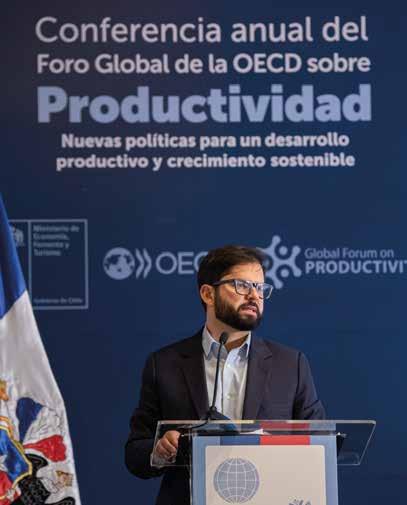
to discuss cutting-edge research on productivity with specialists from different countries and institutions.
In 2023, drawing on its experience in organising hybrid events in the wake of pandemic, the GFP maintained to deliver high-quality events and meetings to its members. This acquired expertise enabled the GFP to reach a broader audience and to solicit high-profile speakers.
2 Chilean President Gabriel Boric making the welcoming remarks of the conference.
1 Ricardo Hausmann during Keynote Speech on “The role of Industrial policies for sustainable productive development and growth”, Day 1.
1 From left to right: Nicolás Grau, Minister of Economy, Development and Tourism of Chile; Francisco Saffie Gatica, Ambassador of Chile and Permanent Representative to the OECD; Alberto van Klaveren, Minister of Foreign Affairs of Chile, Day 1.
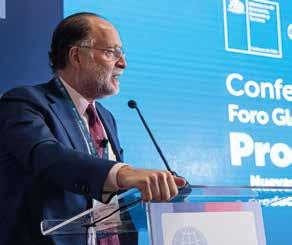
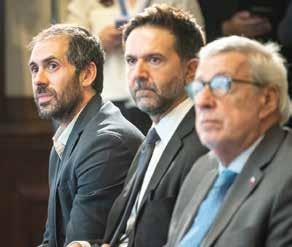
2023 Annual Conference of the Global Forum on Productivity co-organised with the Ministry of Economy, Development and Tourism of Chile Santiago, Chile, 27-28 September 2023 (hybrid event)
The recent deceleration in productivity growth has raised concerns globally. Productivity growth, driven by new ideas, technological innovations, and business models, is crucial for improving living standards and ensuring a better future for generations to come.
The OECD Annual Conference of the Global Forum on Productivity 2023 delved into the realm of industrial policy, discussing the productivity slowdown, global value chains, green finance, regulatory frameworks, and the role of technology in inclusive labour markets. The forum aimed to address the challenges of economic growth,
1 Claudia Sanhueza, Undersecretary for international economic relations, Ministry of Foreign Affairs of Chile, during Session 2 on Global and Regional Value chains for a sustainable transformation, Day 1.
5 The challenge of the productivity slowdown in OECD countries, with Federico Huneuus, Assistant Professor, Department of Economics, Duke University, Rita Bessone Basto, Deputy Director, Portuguese Ministry of Economy and Maritime Affairs, and Filiz Unsal, Head of the Structural Policy Analysis Division, Economics Department, OECD, Day 2.
climate change, and inclusiveness, drawing highlevel figures including President Gabriel Boric, the OECD Secretary-General, several Chilean Ministers, the ECLAC Executive Secretary, the President of the Central Bank of Costa Rica, and national productivity commission chairs.
New technologies are crucial for driving global economic growth, increasing productivity, expanding markets, and promoting healthy competition. Encouraging firms to adopt new technologies and engage in international trade can improve their economic performance and competitiveness. While regulations play an
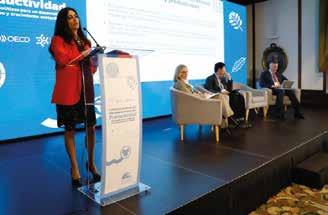
1 Javiera Petersen, Undersecretary, Ministry of Economy, Development and Tourism, introducing the keynote speech, day 1.


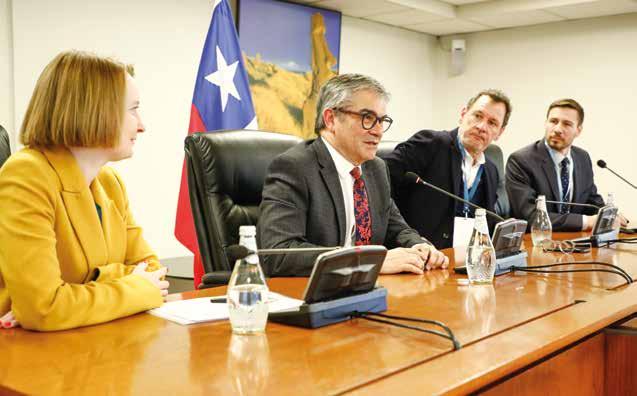
essential role in facilitating entry, investment, and growth in markets, they must be carefully designed to avoid hindering productivity growth.
Additionally, well-crafted regulations can incentivise green investments necessary for achieving net-zero emissions by 2050. Although these transitions might involve short-term challenges and adjustments costs, long-term benefits such as increased productivity via innovation are expected.
Access to skilled labour and harnessing technology’s potential to offer adaptable work
arrangements could further bolster worker productivity. The GFP’s work on human capital’s role in firm productivity growth highlights the significance of strong managerial abilities, employee qualifications, and workplace diversity in enhancing it. Fostering technological advancement, nurturing talent, and designing effective policies should remain foremost objectives to promote sustainable and inclusive growth. The 2024 GFP annual conference will focus on the topic of firms’ human capital in the light of the digital and green transitions and will take place in Paris in the Fall.
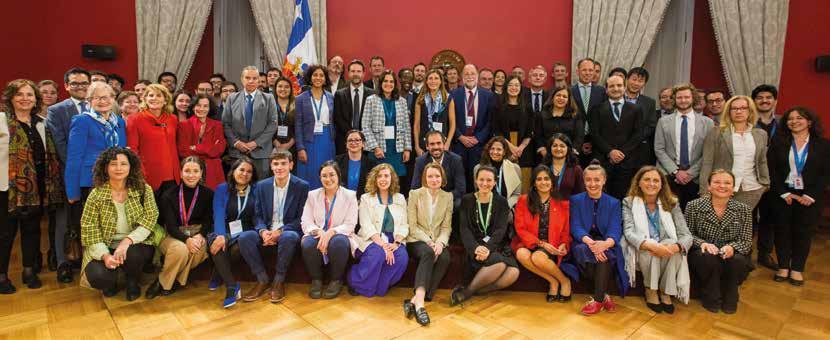
Throughout the year, leading academics and policy experts are invited to present their takes on current challenges for productivity to the Steering Group contributors of the GFP and OECD staff.
To keep the conversation alive and broad-reaching, the full video recordings and materials from our webinars are made available to the general public one month later on the GFP website
November 2023 | “Lessons from a Career in Productivity Research: Some Answers, A Glimpse of the Future, and Much Left to Learn” |
Martin Neil Baily (Brookings)
In the webinar, Martin examined the extent to which the key empirical questions about productivity have been answered by the
literature. In his study, Martin proposed an extended summary of the lessons learned from cross-country comparisons of the levels of productivity in different industries using business economics information. Strong competition is positive for productivity, while regulations and trade restrictions are detrimental. The webinar concludes with an optimistic note on the productivity impact of generative AI. Strong
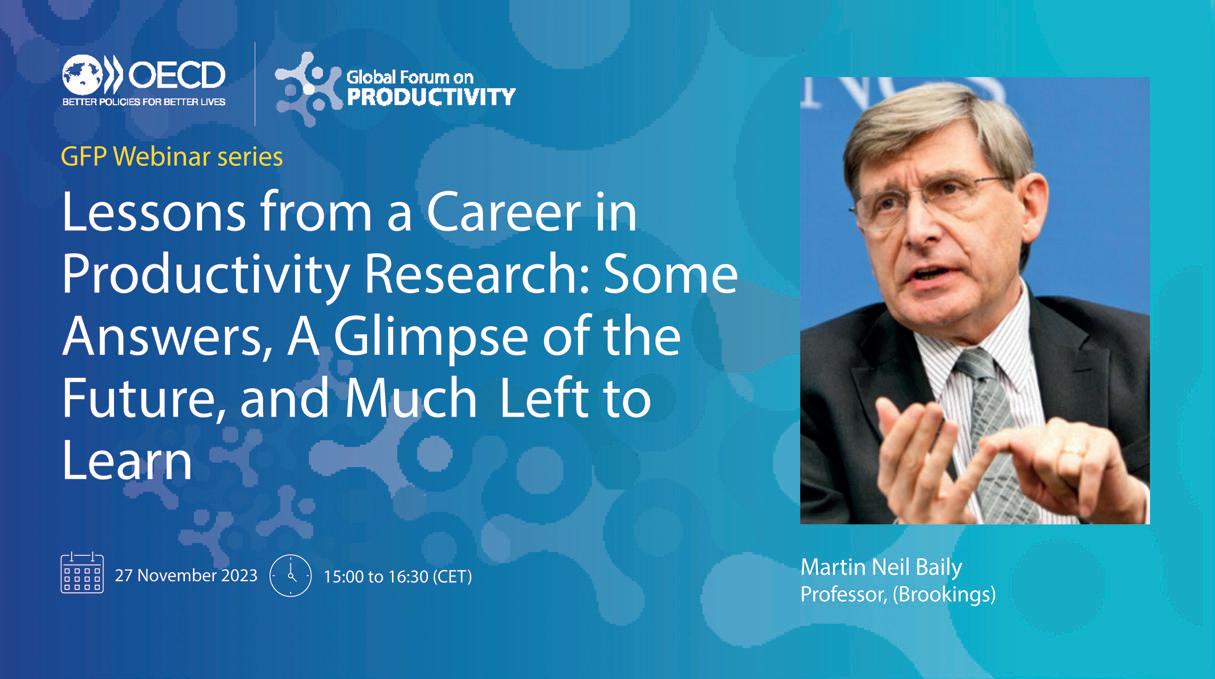

The communication activities of the GFP disseminate information on GFP events, productivityrelated findings and data, as well as other relevant work both at the OECD and in contributing countries. To do so, the GFP team disposes of a number of instruments, namely the GFP website and newsletter, the OECD Productivity Working Paper series, social media (X and LinkedIn) and the mailing list used to circulate messages such as the periodic GFP Updates. Steering Group contributors of the GFP also have their exchanges facilitated by a password-protected O.N.E Community page.
Our biannual newsletter compiles the latest news in GFP work, previews upcoming events and advertises productivity-related information from GFP contributors. With a readership of more than 400 subscribers, our audience includes policymakers, researchers, business representatives, OECD colleagues, and more.
Productivity working papers
December 2023
Gender diversity in senior management and firm productivity
Clara Kögel, Chiara Criscuolo, Peter Gal and Cyrille Schwellnus
May 2023
The green side of productivity: An international classification of green and brown occupations Nathalie Scholl, Sébastien Turban and Peter N. Gal


The GFP welcomes voluntary paper submissions from its supporters, to be published under the OECD Productivity Working Paper Series.
For those interested in publishing productivityrelated papers as part of our series, please reach out to us at Productivity@oecd.org.
In 2023, the GFP updated its country profiles to include new data, information on productivity research and on productivity-enhancing institutions across GFP Steering Group contributors.
The GFP actively engages with its community through social media platforms such as X and LinkedIn, facilitating direct communication and swift information dissemination about its activities. This year, the GFP’s social media presence, through original creative content and targeted communication plans, has significantly expanded, serving as a key indicator of the success of the Annual Conference. The vibrant community engagement on both channels played a crucial role in enhancing the visibility of the conference, while media coverage in Chile achieved notable success, featuring approximately twenty broadcasts across TV, radio, and print publications.
A selection of GFP highlights
ARTICLES
BAE Negocios
Chile busca cooperar con países de OCDE para elevar productividad en 1,5 % promedio
Biobiochile.cl
Con presencia de Boric y Grau: Chile acoge conferencia del Foro Global de Productividad de la OCDE
La Tercera
OCDE: “La productividad en Chile ha ido a la baja al igual que en muchos países de todo el mundo”
TELEVISION
Canal 24 Horas
Presidente Boric Destacó Importancia de los Acuerdos Para el Desarrollo
We had a quick chat with Melissa Vega Monge (Costa Rica), Ihssane Slimani Houti (France) and Junji Kimura (Japan), about what the GFP means to them.



Melissa Vega Monge Central Bank of Costa Rica
Following the recommendation of the European Council, the Government has put in place in 2018 a National Council on Productivity, which is in charge of analysing the recent trends and providing policy recommendations. By participating in the GFP, we also encourage international collaboration, joint policy analyses and best practices sharing.
As productivity is a major determinant of economic growth, wealth and living standards, the declining trend in productivity observed in most advanced countries since the last decades, and France is no exception, has brought the subject back into the spotlight.
Ihssane Slimani Houti French Treasury
Junji Kimura Cabinet Office, Government of Japan
GFP team: What were the main reasons why your country decided to join the GFP?
Melissa Vega Monge: Costa Rica is a small economy that has experienced growth through a gradual trade liberalisation and attraction of FDI. Although Costa Rica´s productivity has been gradually approaching OECD standards, the country still faces challenges in terms of infrastructure, labour market efficiency, social inclusion, and education. As part of the GFP, Costa Rica has had access to global expertise to address these challenges and promote sustainable growth.
Ihssane Slimani Houti: France has been an active participant of the GFP since its creation in 2015.
Productivity remains a key issue for all policy makers and the successive crises during the recent years have strengthened the importance of better understanding the structural and policy drivers of productivity and defining policies aiming at promoting productivity gains.
Finally, as productivity is one of our economic priorities, we’ve decided to take our commitment in the GFP a step further by becoming co-chair of the GFP steering group. It will be a pleasure for me to take on this role.
Junji Kimura: Japan has decided to participate in the GFP in order to contribute to the OECD’s analysis of policy issues and corresponding measures to improve productivity, and to promote mutual cooperation and policy coordination among governments.
GFP team: What do you believe have been the most valuable contributions brought to your country by participation in the GFP?
Melissa Vega Monge: The possibility to engage in joint research and policy analysis is the most valuable contribution brought to Costa Rica by
joining the GFP. By actively participating in the Forum, Costa Rica has gained access to valuable knowledge and best practices to enhance productivity and foster sustainable development. Similarly, the GFP has enriched Costa Rica´s research capability and strengthened its position in the global research community.
Ihssane Slimani Houti: First of all, I would like to welcome the quality and the diversity of the work carried out by the GFP team. Research papers and studies from the GFP and discussions among members are very relevant to provide food for thought on common issues. This forum is also well connected to other OECD works, in particular with synergies with the work programme on economic policy and other OECD committees.
Moreover, regular conferences and workshops organised by the GFP are opportunities to provide a comprehensive view on specific productivity issues.
I am deeply convinced that sharing our best practices, our main current issues and how we can collectively work to improve productivity at a national and global levels is beneficial for all policy makers in order to adapt their policy response to productivity slowdown and to boost economic growth. The Annual Conference of the GFP is in this respect a very privileged time. For instance, the last Annual Conference in Santiago highlighted very important issues on the impact of green transition on productivity growth, echoing some discussions we have at the national level.
Junji Kimura: The most valuable contribution of GFP would be the sharing of good practices in each country in a wide range of areas, including not only productivity gains in individual sectors, but also the spillover effects of productivity gains on the macroeconomy and international trade.
GFP team: What role do you see for GFPproduced research and advice in policy discussions in your country?
Melissa Vega Monge: GFP research offers a comprehensive perspective of the global economy and the role of productivity within it. The novel findings and evidence-based recommendations shared through GFP research offer valuable insights to guide Costa Rican policymakers on how to design effective policies. Likewise, GFP research facilitates the identification of best practices and solutions in accordance with international standards.
Ihssane Slimani Houti: The Forum enriches our national policy discussions by drawing on the work of diverse commissions, organizations within the network, and external experts from academia and think tanks. Through these connections, it offers clear and comprehensive backgrounds for our national policy discussions.
France will host the next annual conference of the GFP in early October 2024. We are looking forward to having in-depth discussions on human capital for productivity growth in the context of new arising economic challenges. This topic is consistent with our national structural reform agenda for the next years. Thereby, the conference will touch on some important topics such as investments in human capital, education, training and skills policies. And I have no doubt that the coming discussions will be useful both for us and for the other members of the GFP.
Junji Kimura: The role of the GFP-produced research and advice would be to provide the evidence needed to consider measures to encourage productivity growth and ensure sustainable and stable growth.

Chiara Criscuolo Head of Productivity, Innovation and Entrepreneurship Division

Katharina Laengle Junior Economist

Mame Fatou Diagne Head of the Country Studies 1 Division

Sarah Michelson-Sarfati Programme and Communications Co-ordinator
Contact information: Productivity@oecd.org Website http://oe.cd/GFP February 2024

Filiz Unsal Head of Structural Policy Analysis Division

Belinha Esteves Budget and Human Resources officer

Luca Marcolin Senior Economist and Project Manager

Yann-Yves Dorville Intern

Francesco Filippucci Junior Economist
Alexandra Favi Programme Assistant